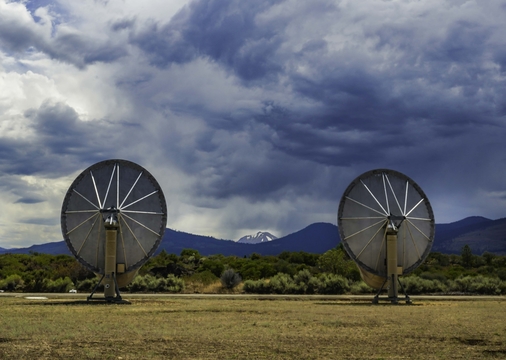BIOLOGY
Sheikh gets NSF Fellowship for Research & Education at the SETI Institute’s Allen Telescope Array
Dr. Sofia Sheikh has been awarded a Mathematical and Physical Sciences Ascending Postdoctoral Research Fellowship (MPS-Ascend) for research and education by the National Science Foundation (NSF). Sheikh’s research is focused on fast radio bursts (FRBs) and developing improved techno signature detection methods, specifically by searching higher radio frequencies and in new areas of the sky. She will also mentor underrepresented students in physics and astronomy, helping them build strong networks and providing valuable research experiences. Sheikh's work will leverage the unique qualities of the Allen Telescope Array (ATA), the only radio telescope constructed with SETI as its principal activity. 
"The combination of Sofia's keen scientific abilities and audacious passion for carving her path is truly remarkable," said Andrew Siemion, Bernard M. Oliver Chair for SETI at the SETI Institute. "Sofia is a world-class scientist who is demonstrating vision, tenacity, and academic excellence in researching a profound and challenging topic."
Sheikh studied physics and astronomy at the University of California, Berkeley, for her undergraduate education and completed her dual Ph.D. in Astronomy and Astrobiology at Penn State. She worked with the Breakthrough Listen project at the Berkeley SETI Research Center throughout her academic studies, developing her interest in radio astronomy and the search for technosignatures.
Sheikh plans three research activities using the ATA:
- Develop hardware and software to increase the backend coherent imaging capabilities of the ATA
- Use these new capabilities to localize and characterize FRBs previously detected with other radio telescopes
- Search for signs of extraterrestrial intelligent life with radio observations of the anti-solar point, defining a particular space and time on the sky from which a distant observer could see Earth in transit around the Sun

"I am honored and extremely excited to be taking my NSF MPS-ASCEND Fellowship to the SETI Institute,” said Sheikh. “I look forward to carrying out the Fellowship's mission by developing the newest frontiers of techno signature research while simultaneously furthering science through the mentorship of underrepresented students in physics and astronomy."
“When you work on a potentially multi-generation project, you really need to think seriously about training your replacements,” said Jill Tarter, co-founder of the SETI Institute. “Sofia's MPS - ASCEND award gives us the opportunity to invoke the next generation and think laterally about what/who/where we can expand opportunities for commensal observing programs.”
Sheikh’s three-year fellowship officially begins on January 1, 2022.

 How to resolve AdBlock issue?
How to resolve AdBlock issue?